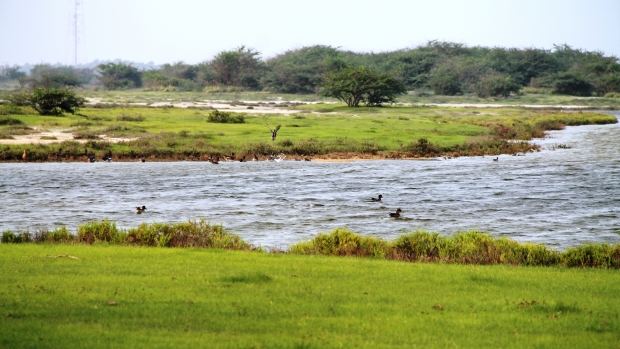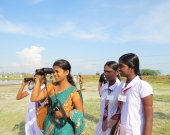Grants :: Medium Grant Facilities :: Introduction of a community-based management model for Vankalai Wetland Ecosystem, Mannar, Sri Lanka
Introduction of a community-based management model for Vankalai Wetland Ecosystem, Mannar, Sri Lanka

A view of vegetation types in the Vankalai sanctuary, Ramsar ... , Vankalai, Sri Lanka © MFF/KEkaratne, 2012
Objectives
Management of the Vankalai coastal wetland is supported through community-driven conservation efforts and alternative livelihoods for its ecosystem dependent communities.
Background
Vankalai Sanctuary was declared as the 4th Ramsar site in Sri Lanka in July 2010. It is 4,839 hectares, and is situated in Mannar District. This Ramsar site consists of several ecosystems which range from arid-zone thorn scrubland, arid-zone pastures and maritime grasslands, sand dunes, mangroves, salt marshes, lagoons, tidal flats, sea-grass beds and shallow marine areas. Due to the integrated nature of shallow wetland and terrestrial coastal habitats, this sanctuary is highly productive, supporting high ecosystem and species diversity. The site provides excellent feeding and living habitats for a large number of water bird species, including annual migrants, which also use this area on arrival and during their exit from Sri Lanka. It harbours more than 20,000 water birds during the migratory season, including the Northern Pintail (Anas acuta), Greater Flamingo (Phoenicopterus roseus) and the Eurasian Wigeon (Anas Penelope), of which Vankalai Sanctuary supports 1% of the population of the latter two species. The site’s coastal and marine ecosystems are important for over 60 species of fish, marine turtles, and rare species such as dugongs (Dugong dugon). These ecosystems provide important spawning and feeding grounds for juvenile fish species such as trevally (Caranx spp.), snappers (Lutjanus spp.), and also host a number of threatened species, such as the Green Turtle (Chelonia mydas), dugongs (Dugong dugon), and saltwater crocodiles (Crocodylus porosus).
Vankalai Sanctuary sustains diverse food chains, while likewise sustaining the livelihoods of fisheries-dependent communities in the area. These areas will be conserved by this project, while sustainable livelihoods such as climate smart fisheries as well as ecotourism (including bird watching and environmentally friendly boat tours to nearby coral reefs).
Target beneficiaries
Residents of Vankalai and Achchankulam villages, in particular: five youth conservation groups; five women rural development societies in the buffer zone of the Vankalai protected area; and 150 families in the identified villages.
Outputs
At the end of the project, the expected results are:
- Community driven conservation mechanism to conserve Vankalai coastal wetland is established and functional;
- Income of communities living within the buffer zone of the Vankalai coastal wetland is increased;
- The capacity of state agencies (e.g., Department of Wildlife Conservation) to monitor the Vankalai Ramsar site is strengthened; and
- Target market for the introduced community-based alternative livelihoods is identified.
Contributions to cross-cutting themes
Gender: This is one of the key focus areas of the project as the micro-credit facilities will be targeting women beneficiaries. The project also facilitates development of women entrepreneurship through provision of training courses. Women participation will be encouraged and necessary arrangements (e.g., employment of female trainers to encourage community women to join training) will be made to ensure equal participation of women.
Climate Change: This topic is little understood by communities, but downscaled data from country level projects reveal that climate chage will have serious implications on the fisheries sector as a whole. However, there is no downscaled data at district level to forecast exact impacts and therefore speculative actions will be taken particularly for livelihood protection and development of fisheries groups. Facilitation of alternative livelihoods through the micro-credit scheme is such precautionary action proposed by the project.
Moreover, awareness of fisheries communities will be raised through various activities, and their knowledge and understanding on climate change will be recorded. Micro credit schemes will target more of post harvest-based livelihoods and cottage industries to minimize economic vulnerability of the community.
Related News
International Migratory Bird Day inspires Jaffna youth in ecosystem conservation
Jaffna, Sri Lanka 26 Aug 2015
Country: Sri Lanka
Topic: Capacity Building
The Jaffna peninsula in northern Sri Lanka is located on a migratory bird pathway traversed by many water bodies, and is known to be a haven for birds and a favored destination of bird lovers. In celebration of the importance of migratory birds and p...
Project Facts
Country
Location
South Bar, Vankalai and Achchankulam villages in Mannar, Sri Lanka
Topic
Duration
1st Sep 2014 to 29th Feb 2016
MFF Grant Amount
LKR 10,889,330
Implementing Partner
Green Movement of Sri Lanka Inc.(GMSL)
Contact person:
Mr Suranjan Kodithuwakku
Chairman, GMSL
Mr Banduranga Kariyawasam
Program Manager, GMSL
Tel: +94 715 358 073
